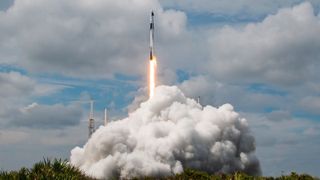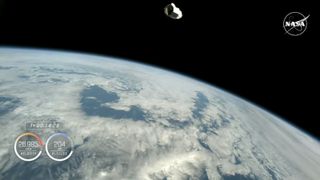SpaceX's Falcon 9 rocket grounded for the 3rd time in 3 months following 'off-nominal' crash-landing in the ocean
The U.S. Federal Aviation Administration is investigating the uncontrolled reentry of part of a Falcon 9 rocket that delivered passengers to the International Space Station in a capsule that will return stranded astronauts Butch Wilmore and Suni Williams to Earth next year.

SpaceX's iconic Falcon 9 rockets have been grounded for the third time in the last three months after part of the rocket uncontrollably crash-landed in the ocean.
The rocket was carrying a capsule to be used in the "rescue mission" that will eventually bring home the astronauts who have been stranded on the International Space Station (ISS) since June. The capsule itself made it to the ISS as planned, but other issues with the mission have prompted an investigation.
At 1:17 p.m. EDT on Saturday (Sept. 28), SpaceX launched a Falcon 9 rocket from Florida's Cape Canaveral Space Force Station. The rocket was carrying two astronauts — NASA's Nick Hague and Russian cosmonaut Aleksandr Gorbunov — to the ISS inside one of the company's Dragon spacecraft capsules, according to Live Science's sister site Space.com.
That same capsule will also transport stranded NASA astronauts Butch Wilmore and Suni Williams back to Earth in February 2025. Wilmore and Williams have been stuck onboard the ISS since June 5 after multiple issues with the Boeing Starliner spacecraft that delivered them into space. These upsets turned a planned week-long mission into what will now be an eight-month stay on the space station. (The compromised Starliner capsule has since landed back on Earth without any passengers.)
Related: SpaceX rockets keep tearing blood-red 'atmospheric holes' in the sky, and scientists are concerned

Saturday's SpaceX mission largely went to plan. The rocket's reusable first-stage booster successfully separated from the second stage and later landed back on Earth. The second stage then deployed the Dragon capsule, which went on to dock with the ISS as expected — and the capsule should be able to return Wilmore and Williams to Earth in just over four months.
However, following the deployment of the capsule, the rocket's second stage experienced an "off-nominal deorbit burn" as it prepared to reenter Earth's atmosphere, which caused the booster to land in the ocean "outside of its target disposal area," Space.com reported.
Sign up for the Live Science daily newsletter now
Get the world’s most fascinating discoveries delivered straight to your inbox.
As a result, the U.S. Federal Aviation Administration (FAA) has begun an investigation into what happened, according to an FAA statement. While the investigation is ongoing, SpaceX cannot launch any more Falcon 9 rockets.
These rockets have already been grounded by FAA investigations twice this year: First on July 11, when one of the rockets prematurely released 20 Starlink satellites that fell back to Earth; and second on Aug. 28, when a reusable first-stage booster exploded while landing back on Earth following another Starlink launch.
The FAA similarly grounded SpaceX's super heavy Starship rocket in April 2023, when the massive spacecraft exploded just four minutes after launching and scattered debris on the ground below.
Despite recent groundings, Falcon 9 rockets normally have an excellent success rate. To date, the rockets have been successfully launched into space more than 99% of the time over the last 14 years.

Harry is a U.K.-based senior staff writer at Live Science. He studied marine biology at the University of Exeter before training to become a journalist. He covers a wide range of topics including space exploration, planetary science, space weather, climate change, animal behavior, evolution and paleontology. His feature on the upcoming solar maximum was shortlisted in the "top scoop" category at the National Council for the Training of Journalists (NCTJ) Awards for Excellence in 2023.